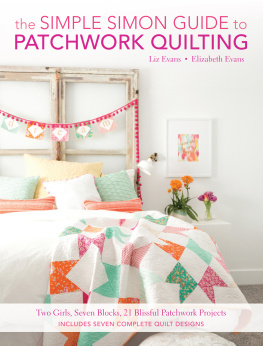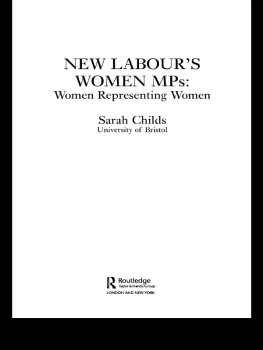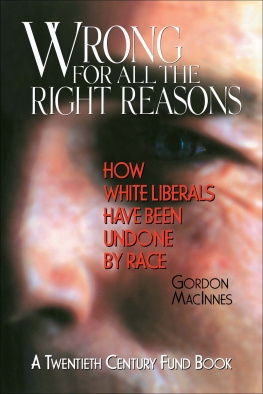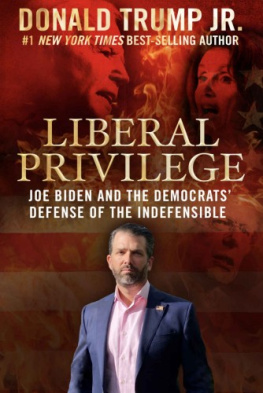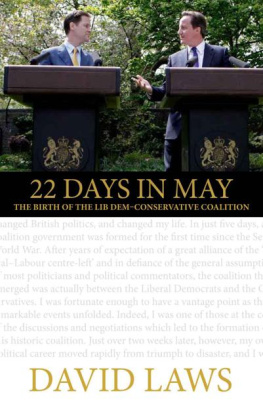Gender and the Liberal Democrats
Gender and the Liberal Democrats
Representing women?
Elizabeth Evans
Copyright Elizabeth Evans 2011
The right of Elizabeth Evans to be identified as the author of this work has been
asserted by her in accordance with the Copyright, Designs and Patents Act 1988.
Published by Manchester University Press
Oxford Road, Manchester M13 9NR, UK
and Room 400, 175 Fifth Avenue, New York, NY 10010, USA
www.manchesteruniversitypress.co.uk
Distributed in the United States exclusively by
Palgrave Macmillan, 175 Fifth Avenue, New York,
NY 10010, USA
Distributed in Canada exclusively by
UBC Press, University of British Columbia, 2029 West Mall,
Vancouver, BC, Canada V6T 1Z2
British Library Cataloguing-in-Publication Data
A catalogue record for this book is available from the British Library
Library of Congress Cataloging-in-Publication Data applied for
ISBN 978-0-7190-8347-1
First published 2011
The publisher has no responsibility for the persistence or accuracy of URLs for
any external or third-party internet websites referred to in this book, and does not
guarantee that any content on such websites is, or will remain, accurate or
appropriate.
Typeset
by 4word Ltd, Bristol, UK
Printed in Great Britain
by CPI Antony Rowe Ltd, Chippenham, Wiltshire
In loving memory of my father,
who always made political discussions lively
Contents
List of abbreviations
|
|---|
ALDE | Alliance for Liberals and Democrats in Europe |
AM | Assembly Member (Welsh) |
AWS | All-women shortlist |
CGB | Campaign for Gender Balance (formerly GBTF) |
COG | Chief Officers Group |
FCC | Federal Conference Committee |
FE | Federal Executive |
FFAC | Federal Finance and Administration Committee |
FPC | Federal Policy Committee |
FPTP | First past the post |
GBTF | Gender Balance Taskforce (now CGB) |
MMP | Mixed Member Proportional |
MSP | Member of the Scottish Parliament |
PPC | Prospective parliamentary candidate, for the 2010 general election |
SAO | Specified Associated Organisation |
SDP | Social Democrat Party |
STV | Single Transferable Vote |
TRS | Two Round System |
WLD | Women Liberal Democrats |
WLF | Womens Liberal Federation |
WO | Womens organisation |
Acknowledgments
I would like to thank the ESRC for supporting this research project (PTA-026-27-2232), the Department of Politics at the University of Bristol for hosting my post-doctoral fellowship, and Goldsmiths, University of London for funding the original PhD that this book is based upon.
The book could not have been produced without the generosity of people within the Liberal Democrats who gave up their time to provide data, answer queries and to participate in the research. I am especially grateful to the women who engaged so honestly and candidly with the project, which made for such a fulfilling and rewarding study. My thanks go to Chris Rennard and the Women Liberal Democrats (WLD) for providing access to minutes and archive material and for their encouragement throughout the entire research process.
Specific thanks must go to Richard Grayson who was an enthusiastic supporter of my research and an encouraging and sympathetic PhD supervisor. Sarah Childs has been both an official and unofficial mentor, and I am hugely grateful for the advice she has given me. Her interest, experience and insight have been invaluable to this research, which was inspired by her critical work on the Labour Party. I would also like to thank Joni Lovenduski and Andrew Russell for their supportive comments and suggestions, during what was a surprisingly enjoyable viva.
I greatly appreciate the comments I have received on papers that I have presented at various conferences, especially at the Elections, Parties and Public Opinion (EPOP) annual conference. Additionally, several people kindly read various drafts of this book, making helpful suggestions; in particular I would like to thank the following: Ellie Cumbo, Rekha Diwaker, Chrissie Eason, Francesca Gains, Lisa Harrison, Rainbow Murray, Nirmala Rao and Kristi Winters. I am also grateful to the Women and Politics PSA group for providing a supportive network. I would also like to thank the anonymous referee for comments on the draft of this book.
An earlier version of appeared as Supply or Demand? Women Candidates and the Liberal Democrats, British Journal of Politics and International Relations, Vol.10 No.4, pp. 590606 (2008), copyright Wiley-Blackwell.
I am grateful to my parents for their encouragement, and to my brother Matt proofreading numerous drafts. Finally, Id like to thank Gareth for his love and for putting up with me throughout this lengthy process.
Foreword
Elizabeth Evans express purpose is to explore why the Liberal Democrats have so few women MPs. Her answers are vital to the future of the Liberal Democrats as a major force in British politics. This is a well-timed and exceptional feat of research. It looks in depth at a particular aspect of a political party, a party which was at one time a colossus on the British political stage, redolent with figures like Gladstone and Lloyd George, giants who passed through Downing Street. Then, abruptly, in the early part of the twentieth century, it all but collapsed, not least because for too long it had disdained the demand by millions of people women for the right to vote. Ask any voters past or present where the Liberals (and now the Liberal Democrats) rank in the advance of women, in the expression and concentration and prioritising of womens issues, and they will stare at you in bemusement. The honest answer is it doesnt rank at all. It would simply not cross anyones mind that women should flock to it as their champion. Remedies lie in this work.
It wasnt until Elizabeth Shields unexpectedly won the Ryedale by-election with a massive swing in 1987 that the first Liberal female MP since Megan Lloyd George in 1945 entered the House of Commons. This dismal record has not improved much. This is no way to set out your stall to become a governing party once again. One look around the world shows that in politics, no actions, let alone exhortation, to advance women in Parliaments will succeed without some form of quota. To this end, quotas are endorsed by the United Nations, under the title Temporary Special Measures. Countries with more than a threshold level of 30 percent women in parliament share two things in common: their electoral system uses some form of proportional representation, and they use quotas.



